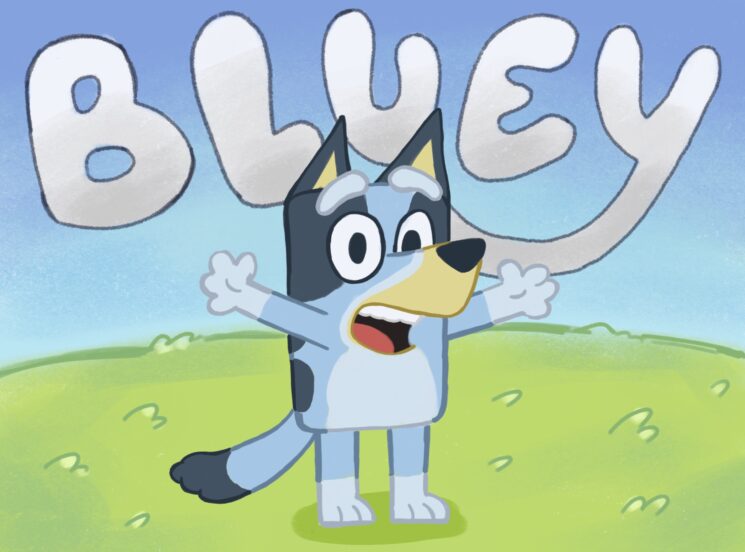
By Arielle Nguyen
Every few decades a new blue dog arrives to lead the generations. Remember “The Huckleberry Hound Show” or “Blue’s Clues?” As a cartoon appreciator, these became classic hits of my life, along with the newest blue dog: Bluey!
The Australian show “Bluey” follows the adventures of the titular blue heeler pup and her family, mixing the capriciousness of children, the whimsy of imagination and best of all: an insight into parenting. And dogs. And colors that dogs can see. Isn’t that great?
I first heard about “Bluey” through my younger brother, who was quizzing our entire family on the names of the family members. “Who is the mom?” “Who is the dad?” He would quiz us almost every day until finally, I decided to sit down and watch my first episode: “Sleepytime.” I remember thinking, It’s only eight minutes.
I suppose the short lengths make it appealing to many attention spans. Please note that I’m a student in the modern age with social media and easily accessible entertainment.
Almost five months later, my brother and I successfully binged its three seasons and now my phone’s wallpaper is “Bluey.” And I can recite lines from the episodes.
No, it’s not an obsession! The cartoon’s just aesthetically pleasing!
The cartoon, like its former blue dog guides, captivates and informs even the oldest of generations. Take it from my mom, who knows all the characters’ names and began remembering lines from her favorite episodes. I do know why she enjoys the cartoon, though — my brother began to pick up on the two kids, Bluey and Bingo’s, mannerisms.
Occasionally, Bluey and Bingo can quickly escalate into two aggravating kids. It’s to be expected, of course! However, it’s not cute when a kid is desperately trying to get your attention while you’re speaking with others. The episode “Wagon Ride” plays with this common scenario. In this seven-minute installment, Bluey anxiously waits to go to the playground despite her father Bandit stopping every time he meets a friend. By the end of the episode, Bandit teaches Bluey how to entertain and care for herself when she’s bored, as well as a strategy they can use so she doesn’t interrupt a conversation. The episode successfully executes a lesson on patience and self-regulation in an aesthetically pleasing and simple fashion.
“Wagon Ride” also taught my brother to stop talking when others are speaking. Win-win.
Furthermore, even parents need some time to care for themselves. The episode “Sheepdog” teaches parents and kids alike that “sometimes moms just need twenty minutes.” Chili, the mom, asks Bandit to look over the kids while she takes a well-deserved rest, sparking anxiety in Bluey. The process taken to prioritize Chili’s well-being easily applies to real life. It’s okay to be selfish in moderation. And usually, you’re not your best self when impoverished!
All of the series’ episodes are easily digestible for the youngest of ages, packing life lesson after life lesson. Four seasons. There are four seasons worth of lessons for kids and adults. There’s “Yoga Ball” that teaches about self-advocating, “Baby Race” that teaches parents that people grow and develop at their own pace and “Camping” that illustrates the concept of people coming and going.
I didn’t think I’d learn about such themes in a children’s show, especially in such a mature, transparent and entertaining way.
There have been a few episodes that intertwined interesting, sometimes heavy topics with the playful nature of “Bluey,” most of which have been censored from the popular streaming platform, Disney+.
“Dad Baby” plays with the idea of childbirth, and I know how bad that sounds! I don’t think much was bad about it — it wasn’t graphic nor very inappropriate, though there were scenes depicting childbirth. I feel it was honestly played for laughs, and I watched it legally on “Bluey’s” YouTube. And I laughed hard.
The episode “Taxi” ends with Bingo’s character pretending to vomit on Bandit’s lap. Thankfully, the episode was only altered to remove that scene instead of fully censored.
Furthermore, many episodes can paint an ideally perfect picture of parenting, something that some parents may feel they don’t live up to. Comparing yourself to others is prevalent among all ages, and this “perfect” parenting experience may feel unobtainable and unrealistic to families. However, this can easily turn into another life lesson for parents and children! Some families just work differently than others, and that’s okay.
There were a few other censored episodes that concerned insensitive wording, potty humor and slang, yet these are normal topics that arrive in childhood. I remember enjoying every little indication of toilets and vomit — it’s why “Shrek” was a hit!
Then again, it’s Disney.
These past five months taught me a lot of things: school is only going to get harder, friends come and go and “Bluey” will forever be my therapeutic show. Watching the cartoon appeals to my inner child while also teaching me life lessons that some cartoons and subjects could never teach.





